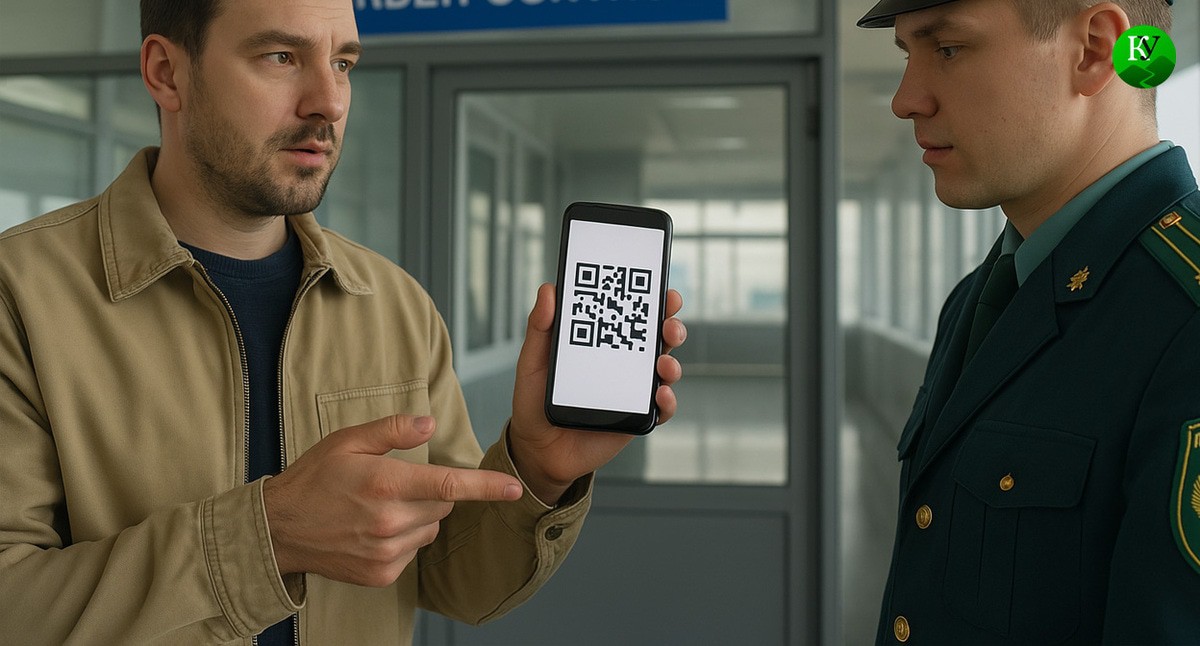QR code requirements at the border have made it difficult for residents of the South Caucasus to enter Russia
The absence of a QR code, which, according to the new rules, citizens of the South Caucasus states are recommended to have for entry into Russia, leads to delays at the border and becomes a reason for refusal of entry.
As "Caucasian Knot" wrote, on June 30, a new entry procedure into Russia for citizens of visa-free countries, including Azerbaijan, Armenia and Georgia, came into force. They must register in the state application RuID no later than three days before the trip, indicating their data and the purpose of their visit.
Registration in the RuID application includes photographing a person and recording a sample of his voice, and already in Russia it will be necessary to confirm the data at a multifunctional center (MFC). When filling out the application, it is also necessary to upload a photo of an identity card and indicate which regions of the country you plan to visit, Kommersant reported.
Some foreign citizens perceived the innovation as “an additional bureaucratic procedure that complicates the lives of foreigners in Russia.” At the same time, one of them, Alisher from Uzbekistan, did not express regret about the tightening of entry conditions to Russia.
They don’t let us freely into Russia – we’ll work in European countries
“Perhaps now our compatriots will think about their value and will strive for more decent working conditions. They don’t let us freely into Russia – we’ll work in European countries,” he told a “Caucasian Knot” correspondent.
The man explained that he had previously worked in Krasnodar building houses as a labor migrant. "But there was nothing left from my income: bribes, all sorts of extortions and innovations - and my stay in Russia became meaningless. And I don’t even want to remember all the bullying and humiliation that I went through. Now I work in Europe, the attitude towards migrants is much more humane. This is my personal experience," Alisher said.
A representative of the border service at Moscow's Sheremetyevo Airport told a "Caucasian Knot" correspondent that the new initiative has not yet affected the work of border guards. "We have not received any instructions regarding the mandatory presence of the RuID application or QR code for those wishing to enter Russia. The entry regime into the country is carried out in the same way,” he said.
On June 26, the Ministry of Digital Development warned the Ministry of Transport and the Ministry of Economic Development in an official letter about the “voluntary nature of filling out an application for entry into the Russian Federation using the RuID application as part of an experiment.”
At the same time, human rights activists began to record complaints about the new entry rules into the country, a lawyer for migrants Valentina Chupik told a “Caucasian Knot” correspondent.
Some are allowed in, some are not allowed in
“It happens in different ways. In most cases, a QR code is required as mandatory, they keep you at the border for many hours, then they let some through, they don’t let some through, and they give reasons for not letting through, including the lack of a QR code, although others are let through without it,” the human rights activist said.
Registration in RuID or its absence has almost no effect on letting through the border, she notes. “Unless the border guards also ask this question and arbitrarily accuse those who were not let through of not having completed this registration (including those who passed but did not receive a QR code, since the application often does not work),” she said.
Chupik expressed confidence that after the project is tested, it will be made “mandatory, if not at the level of a regulatory act, then at the level of law enforcement.”
According to her, recently, citizens of Armenia and Tajikistan most often seek legal assistance, despite the complication of relations between Russia and Azerbaijan. "There have been fewer requests from citizens of Azerbaijan since June 26, and more from citizens of Armenia and Tajikistan," said Valentina Chupik.
On June 27, as a result of a special operation by security forces in Yekaterinburg, natives of Azerbaijan, brothers Guseyn and Ziyaddin Safarov, died, and other representatives of the diaspora were injured. This was followed by a deterioration in relations between the two states, materials about which were collected by the "Caucasian Knot" on the thematic page "The Collapse of Ties between Baku and Moscow".
The head of the "Migration and Law" network Svetlana Gannushkina (included in the register of foreign agents) reported that her organization has not yet recorded significant violations in connection with the launch of the "digital passport for foreigners" (RuID) project.
"So far, there is nothing definite. [Azerbaijanis] only had problems in Yekaterinburg and Voronezh," Gannushkina told a "Caucasian Knot" correspondent.
Recall that in May 2024, Vladimir Putin signed a decree allowing Georgian citizens to enter Russia without a visa for up to 90 days, with the exception of labor migrants. In October of the same year, Putin extended the visa-free regime for Georgian citizens, allowing them to enter Russia for more than 90 days, including for work and education, without obtaining a visa.
Translated automatically via Google translate from https://www.kavkaz-uzel.eu/articles/412865







![Tumso Abdurakhmanov. Screenshot from video posted by Abu-Saddam Shishani [LIVE] http://www.youtube.com/watch?v=mIR3s7AB0Uw Tumso Abdurakhmanov. Screenshot from video posted by Abu-Saddam Shishani [LIVE] http://www.youtube.com/watch?v=mIR3s7AB0Uw](/system/uploads/article_image/image/0001/18460/main_image_Tumso.jpg)